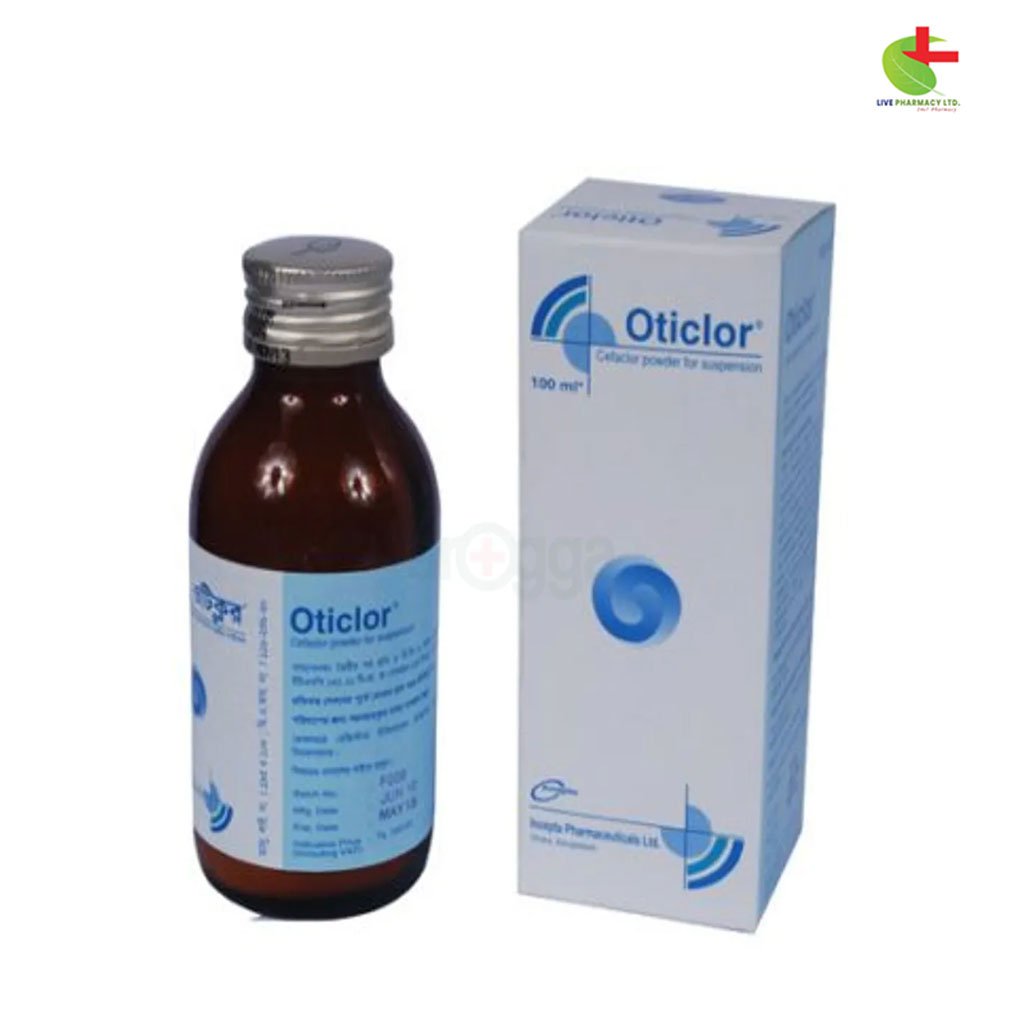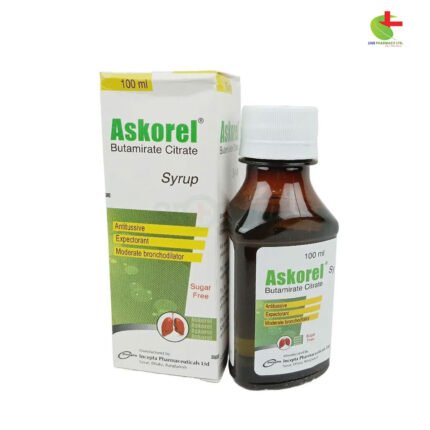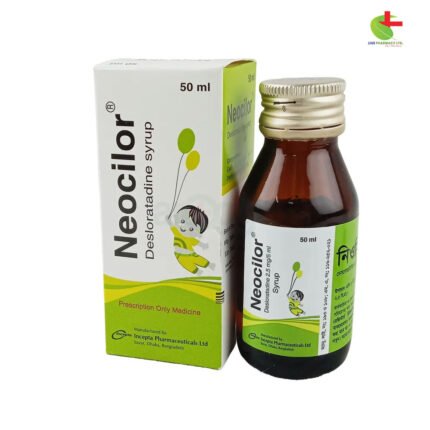Oticlor Suspension
180.00৳ Bottle (100ml)
- Oticlor is a second-generation cephalosporin antibiotic indicated for treating respiratory tract infections, otitis media, pharyngitis, tonsillitis, urinary tract infections, and skin infections caused by various bacteria.
- It is effective against organisms like Streptococcus pneumoniae, Escherichia coli, and Staphylococcus aureus.
- Dosage varies for adults and children, with careful monitoring advised for patients with renal impairment and those on anticoagulants.
- Potential side effects include gastrointestinal symptoms and allergic reactions; caution is advised in pregnant and nursing women.
 Brand
Brand
|
Incepta Pharmaceuticals Ltd |
|---|---|
 Generics
Generics
|
Cefaclor Monohydrate |
 Type
Type
|
Powder for Suspension |
Indications
Oticlor is prescribed for the management of various infections, including:
- Respiratory Infections: Such as pneumonia and bronchitis, caused by Streptococcus pneumoniae, Haemophilus influenzae, and Streptococcus pyogenes.
- Otitis Media: Resulting from infections by Streptococcus pneumoniae, Haemophilus influenzae, Staphylococcus, and Streptococcus pyogenes.
- Pharyngitis and Tonsillitis: Primarily caused by Streptococcus pyogenes.
- Urinary Tract Infections: Including pyelonephritis and cystitis, stemming from Escherichia coli, Proteus mirabilis, Klebsiella spp., and coagulase-negative Staphylococci.
- Skin Infections: Affecting skin and its structures due to Staphylococcus aureus and Streptococcus pyogenes.
Use only as directed by a registered healthcare professional.
Pharmacology
Cefaclor, a second-generation cephalosporin antibiotic, exhibits resilience against β-lactamase degradation and possesses a wide-ranging antimicrobial spectrum. In vitro studies demonstrate its effectiveness against:
- Alpha and beta-hemolytic Streptococci
- Staphylococci, including both coagulase-positive and coagulase-negative strains, as well as penicillinase-producing strains
- Streptococcus pneumoniae
- Streptococcus pyogenes (Group A β-hemolytic)
- Branhamella catarrhalis
- Escherichia coli
- Proteus mirabilis
- Klebsiella species
- Haemophilus influenzae, including strains resistant to ampicillin.
Cefaclor is typically effective in eliminating Streptococci from the nasopharynx.
Dosage & Administration
Capsule Formulation:
- Adults: The standard dosage is 250 mg every 8 hours. For severe infections or those caused by less susceptible organisms, the dosage may be increased to a maximum of 4 g per day. In cases of β-hemolytic Streptococcal infections, treatment should continue for a minimum of 10 days.
Powder for Suspension & Pediatric Drops:
- Children: The recommended daily dosage for pediatric patients older than 1 month is 20 mg/kg/day, divided into doses every 8 hours. For severe infections like otitis media or infections caused by less susceptible organisms, a dosage of 40 mg/kg/day is advisable, not exceeding 1 g per day. Safety and efficacy in infants younger than 1 month have not been established.
Dosage Guidelines:
- Under 1 year (9 kg):
- Powder for Suspension: ½ tsp three times daily
- Pediatric Drops: 0.625 ml three times daily
- 1-5 years (9 kg-18 kg):
- Powder for Suspension: 1 tsp three times daily
- Pediatric Drops: 1.25 ml three times daily
- Over 5 years:
- Powder for Suspension: 2 tsp three times daily
Renal Impairment: Cefaclor can be administered with caution in patients with impaired renal function. Dose adjustments are typically unnecessary for patients with moderate to severe renal impairment.
In Patients Undergoing Hemodialysis: Hemodialysis can reduce serum half-life by 25-30%. A predialysis loading dose of 250 mg-1 g is recommended, followed by a maintenance dose of 250-500 mg every 6 hours during the interdialytic period.
Geriatric Use: Clinical data do not indicate differences in response between elderly and younger patients, although some older adults may exhibit increased sensitivity.
Use only as directed by a registered healthcare professional.
Interactions
Oticlor may yield false-positive results for glucose in urine tests utilizing Benedict’s or Fehling’s solutions. Concurrent use of Oticlor with oral anticoagulants may enhance anticoagulant effects, with rare instances of increased prothrombin time (with or without clinical bleeding). Regular monitoring of prothrombin time is advisable, with dosage adjustments as necessary.
Contraindications
Cefaclor is contraindicated for individuals with a known allergy to cephalosporin antibiotics.
Side Effects
Potential gastrointestinal side effects may include diarrhea, nausea, and vomiting in some patients taking Oticlor. Rare instances of transient hepatitis and cholestatic jaundice have been reported, as well as fever, abdominal discomfort, superinfection, renal dysfunction, toxic nephropathy, hemorrhage, elevated LDH levels, and pancytopenia.
Pregnancy & Lactation
There are no sufficient well-controlled studies in pregnant women. This medication should only be used during pregnancy when clearly needed. Small quantities of Cefaclor can be found in breast milk, and the effects on nursing infants are not well understood. Caution is recommended when administering Cefaclor to nursing mothers.
Precautions & Warnings
Prescribing Oticlor in the absence of confirmed or strongly suspected bacterial infections is unlikely to benefit the patient and may increase the risk of developing drug-resistant bacteria.
Prolonged usage may lead to the overgrowth of non-susceptible organisms. If superinfection occurs, appropriate measures should be taken. Probenecid can inhibit the renal excretion of Oticlor. Caution is advised when prescribing antibiotics, including cephalosporins, to individuals with a history of gastrointestinal diseases, particularly colitis.
Before starting therapy with Oticlor, it’s essential to inquire about any prior hypersensitivity reactions to Oticlor, cephalosporins, penicillins, or other medications. Care should be taken when administering Oticlor to patients with known drug allergies.
Overdose Effects
Symptoms of Oticlor overdose may include nausea, vomiting, abdominal discomfort, and diarrhea.
Therapeutic Class
Second-generation cephalosporins.
Reconstitution
Powder for Suspension: Shake the bottle thoroughly before adding water. To prepare a 100 ml suspension, combine 62.5 ml (12.5 spoonfuls) of boiled and cooled water in two portions, shaking well until fully mixed. The prepared suspension can be used within 7 days at room temperature and 14 days if refrigerated.
Pediatric Drops: Shake the bottle well before mixing. To prepare 15 ml of pediatric drops, add 10 ml (2 spoonfuls) of boiled and cooled water in two portions and shake until the powder is completely mixed. The prepared drops can be used within 7 days at room temperature and 14 days when refrigerated.
Storage Conditions
Store at room temperature, protected from light. After reconstitution, the suspension can be used within 7 days at room temperature and 14 days when refrigerated (2-8°C). Always keep the bottle tightly closed.













Reviews
There are no reviews yet.